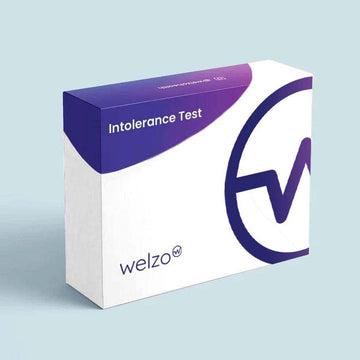Order test kits for intolerances and allergies if you are experiencing allergic reactions to certain foods. Welzo food intolerance tests include testing kits for dietary allergens, foods and environmental allergens that cause symptoms. These tests use a blood sample or just a few hair strands to detect reactions to substances responsible for symptoms such as bloating, rashes, other skin issues, and headaches.
If you regularly experience these signs, quickly select your desired test kit and check your food intolerance test results.
What are Intolerance Tests?
Intolerance tests help diagnose the cause of allergy symptoms. They are necessary in some situations. For example, skin bumps caused by gluten intolerance can easily be confused with various skin conditions. Although the science behind these tests is still debated, users have appreciated them as they help significantly change food preferences and lifestyle.
The interpretation of these tests is a sensitive matter and should be left to a healthcare professional or allergist. Nevertheless, they ensure authentic and actionable reports for food allergies such as wheat intolerance and allergy. Read our blog titled "Can gluten intolerance cause skin bumps?" for information about this sensitive issue.
Who are Intolerance Tests for?
Welzo's Intolerance Tests help people identify substances in multiple foods that trigger signs of allergic reactions, such as bloating, hives, skin reactions, headaches, fatigue, and rashes. These signs are noted in various immune system reactions, such as irritable bowel syndrome.
These tests pinpoint these triggers, allowing users to make more informed dietary choices and improve digestive health. These are simple blood/ hair tests that are easy to perform. Based on data about scientific studies, BBC articles and NCBI sources, home-based allergy tests have less scientific accuracy than professional blood tests and hair assays.
What are the most popular Intolerance Tests?
Most popular skin prick tests and hair strand tests available at Welzo are;
-
Food Intolerance Test that detects allergens in specific foods. It needs just a few strands of hair to detect 975 items. This kit has a price tag of £39.99.
-
The Premium Intolerance Test performs hair analysis to diagnose food intolerances. It has a price tag of £49.99.
-
The Allergy & Intolerance Test is a simple blood test that detects 78 common food allergies and intolerances. It is available for £69.00 at Welzo.
-
Allergy Testing Kits that use blood samples to measure IgE antibodies. It is available with a price tag of £79.00.
-
The Environmental Intolerance Test measures 975 suspected food allergens. It has a price tag of £39.99.
These tests measure antibodies in the body in response to allergens that disturb the digestive system. A nutritional therapist should ideally interpret them.
Benefits and features of Intolerance Tests
These testing kits meet Welzo's quality control standards. Salient features of these tests are;
-
They help identify potential dietary substances and food intolerances that cause skin and digestive system issues.
-
They enhance well-being by enabling personalised adjustments in the diet.
-
These tests ensure accurate, convenient, and quick results in the comfort of your home.
-
They help reduce symptoms of allergy reactions such as bloating, headaches, fatigue and mood swings.
-
Welzo has UK-accredited doctors who provide lab-verified clinical insights and professional guidance to its clients.
Why does Welzo select Intolerance Tests?
Welzo has included these tests in its collection to empower people to make well-informed choices about their lifestyle and diets.
-
These tests help diagnose often overlooked causes of digestive discomfort, bloating and fatigue.
-
These nutrition & intolerance tests align with Welzo's goal of home-based and easily accessible healthcare solutions for all.
-
Welzo partners with UKAS-accredited labs for reliable, actionable and accurate results.
How to use Intolerance Tests?
How to use the guidelines varies for blood tests or hair-based tests. These are;
Hair-based intolerance tests
These tests require a very small hair sample of just 4-5 strands, cut close to the roots. The sample is placed in a collection bag and shipped to a Welzo partnered lab for analysis. These labs use bio-resonance technology to assess the frequency responses of hair to hundreds of environmental triggers and foods.
Blood-based tests
These tests require a small blood sample from a finger prick, which is then shipped in prepaid envelopes to Welzo's UKAS-accredited labs. These laboratories analyse these samples for IgG responses to various foods.
Quality and Certifications of Intolerance Tests
Welzo partners with laboratories that are accredited with UKAS (United Kingdom Accreditation Service). These laboratories claim strict compliance with;
-
ISO 17025 (general guidelines for testing and collaborative laboratories
-
ISO 15189 (requirements for medical laboratories)
-
ISO 13485 (quality management systems for medical devices)
Welzo- a digital healthcare platform
Welzo, a UK-based digital healthcare platform, is proud to provide allergy testing kits, online consultation & ongoing support with its healthcare providers. It collaborates with UK-accredited labs to deliver healthcare services right at the client's doorstep.
It thus promises to empower people to take a more proactive approach to their healthcare. It ensures that its products have a scientific basis for their accuracy. Overall, it is a consumer-focused wellness solution that is designed to bridge the gap between modern technology and clinic-based diagnostics.
Reviews
Users and healthcare professionals alike rate Welzo intolerance tests excellently. It is reflected in their reviews at Welzo. They are ranked 'excellent' by thousands of users at TrustIndex. Check Welzo for its food intolerance tests and read client reviews.
Dr Mathilde Mbouck (MD Internal Medicine and Family Medicine) has reviewed intolerance tests by Welzo as;
"As a Doctor, I find intolerance tests by Welzo as highly convenient and reliable way to identify food intolerances and allergies. They can be performed at the comfort of home and actionable and clear reports can be generated."
People Also Ask
How can a person test for intolerances & food challenges?
A blood test is the most common test to check food intolerances. During this test, a person's blood is taken using venous puncture and processed on a testing kit.
Can a sore throat occur due to a food allergy?
Food intolerances and allergies mostly cause digestive symptoms. Sometimes, they can cause respiratory symptoms such as sore throat, watery eyes, itchiness, sneezing, hives, eczema, and rashes.
How to perform allergy testing in kids?
Intradermal tests are most commonly used to test allergies in children. For that purpose, a healthcare professional may inject a solution containing allergens into the child. Another option is to use a small scratch to apply the solution.
What is the gold standard for food allergy testing?
Oral food challenge is the gold standard for food allergy testing. In this procedure, a small amount of food, such as wheat and dairy products (milk), is eaten slowly under medical supervision and in gradually increasing amounts to diagnose a food sensitivity.
Disclaimer: This information is just for educational purposes only. It is not a substitute for medical advice. Consult an allergist or a healthcare provider for more precise guidelines.











 Rated Excellent by 26,523+ Reviews
Rated Excellent by 26,523+ Reviews